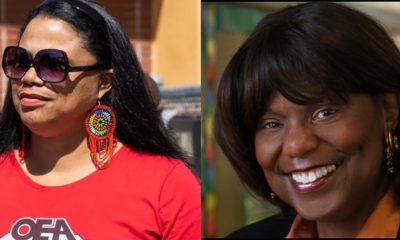Activism
School Board Election Could End Deadlock on Sharply Divided Board
With the board unable to reach a decision on appointing a new member, the Alameda County Office of Education recently stepped in, ordering an election in November to fill the remaining one year-term for the District 5 seat, which represents the Fruitvale District. The D5 seat was left vacant when its representative, Boardmember Mike Hutchinson, ran and ultimately won in D4 after his residence address was moved during the citywide redistricting process.

So far, one candidate has stepped forward: Sasha Ritzie-Hernandez
By Ken Epstein
The Oakland Board of Education, operating at present with one vacancy, is sharply divided, 3-3, on many major issues that impact Oakland families, including the future of special education programs, budget cuts at school sites, school closings, and whether to support “common good” demands for community needs raised by Oakland teachers during their recent strike.
With the board unable to reach a decision on appointing a new member, the Alameda County Office of Education recently stepped in, ordering an election in November to fill the remaining one year-term for the District 5 seat, which represents the Fruitvale District.
The D5 seat was left vacant when its representative, Boardmember Mike Hutchinson, ran and ultimately won in D4 after his residence address was moved during the citywide redistricting process.
On one side of the polarized school board are members who have been outspokenly opposed to school closings and spoke during the recent Oakland teachers’ strike in favor of the union’s “common good” demands: VanCedric Williams, Jennifer Brouhard, and Valarie Bachelor.
On the other side are Board President Hutchinson, Sam Davis, and Cliff Thompson, who have tended to align with positions taken by the district administration, including voting to potentially merge or consolidate schools and voting to cut special education special day classes and programs in the face of major parent opposition.
So far, one candidate for the D5 seat has stepped forward: Sasha Ritzie-Hernandez, who strongly supports Oakland educators. A graduate of Oakland High and Holy Names University, she already has a campaign website: www.sasharitziehernandez.com.
Born in Mexico, she migrated to Oakland at the age of 12 in 2002 and has lived in the Fruitvale District for more than 20 years. Her mother was a teacher in Mexico for 24 years, and Ritzie-Hernandez describe herself as someone who was on the “frontlines” backing the last two Oakland teachers’ strikes.
Openly queer and married to a woman, she is coalition coordinator of the Bay Area Coalition for Education Justice (BACEJ), where she works for “quality public education for students,” she said on her website.
She has been an activist much of her life. While in high school she organized against police brutality in the wake of the killing of Oscar Grant and worked for the DREAM Act.
She formerly worked for Alameda County’s Registrar of Voters Office as a bilingual instructor and organized support for the campaign for the passage of Reparations for Black Students resolution. She currently serves on the Alameda County Spanish Language Advisory Committee.
“My goal (on the board) is to create a culture of accountability through authentic shared decision-making. With your support we can have a school board that centers and is accountable to students, families, and educators,” she wrote.
Activism
OP-ED: AB 1349 Puts Corporate Power Over Community
Since Ticketmaster and Live Nation merged in 2010, ticket prices have jumped more than 150 percent. Activities that once fit a family’s budget now take significant disposable income that most working families simply don’t have. The problem is compounded by a system that has tilted access toward the wealthy and white-collar workers. If you have a fancy credit card, you get “presale access,” and if you work in an office instead of a warehouse, you might be able to wait in an online queue to buy a ticket. Access now means privilege.

By Bishop Joseph Simmons, Senior Pastor, Greater St. Paul Baptist Church, Oakland
As a pastor, I believe in the power that a sense of community can have on improving people’s lives. Live events are one of the few places where people from different backgrounds and ages can share the same space and experience – where construction workers sit next to lawyers at a concert, and teenagers enjoy a basketball game with their grandparents. Yet, over the past decade, I’ve witnessed these experiences – the concerts, games, and cultural events where we gather – become increasingly unaffordable, and it is a shame.
These moments of connection matter as they form part of the fabric that holds communities together. But that fabric is fraying because of Ticketmaster/Live Nation’s unchecked control over access to live events. Unfortunately, AB 1349 would only further entrench their corporate power over our spaces.
Since Ticketmaster and Live Nation merged in 2010, ticket prices have jumped more than 150 percent. Activities that once fit a family’s budget now take significant disposable income that most working families simply don’t have. The problem is compounded by a system that has tilted access toward the wealthy and white-collar workers. If you have a fancy credit card, you get “presale access,” and if you work in an office instead of a warehouse, you might be able to wait in an online queue to buy a ticket. Access now means privilege.
Power over live events is concentrated in a single corporate entity, and this regime operates without transparency or accountability – much like a dictator. Ticketmaster controls 80 percent of first-sale tickets and nearly a third of resale tickets, but they still want more. More power, more control for Ticketmaster means higher prices and less access for consumers. It’s the agenda they are pushing nationally, with the help of former Trump political operatives, who are quietly trying to undo the antitrust lawsuit launched against Ticketmaster/Live Nation under President Biden’s DOJ.
That’s why I’m deeply concerned about AB 1349 in its current form. Rather than reining in Ticketmaster’s power, the bill risks strengthening it, aligning with Trump. AB 1349 gives Ticketmaster the ability to control a consumer’s ticket forever by granting Ticketmaster’s regime new powers in state law to prevent consumers from reselling or giving away their tickets. It also creates new pathways for Ticketmaster to discriminate and retaliate against consumers who choose to shop around for the best service and fees on resale platforms that aren’t yet controlled by Ticketmaster. These provisions are anti-consumer and anti-democratic.
California has an opportunity to stand with consumers, to demand transparency, and to restore genuine competition in this industry. But that requires legislation developed with input from the community and faith leaders, not proposals backed by the very company causing the harm.
Will our laws reflect fairness, inclusion, and accountability? Or will we let corporate interests tighten their grip on spaces that should belong to everyone? I, for one, support the former and encourage the California Legislature to reject AB 1349 outright or amend it to remove any provisions that expand Ticketmaster’s control. I also urge community members to contact their representatives and advocate for accessible, inclusive live events for all Californians. Let’s work together to ensure these gathering spaces remain open and welcoming to everyone, regardless of income or background.
Activism
Oakland Post: Week of December 31, 2025 – January 6, 2026
The printed Weekly Edition of the Oakland Post: Week of – December 31, 2025 – January 6, 2026

To enlarge your view of this issue, use the slider, magnifying glass icon or full page icon in the lower right corner of the browser window.
Activism
Big God Ministry Gives Away Toys in Marin City
Pastor Hall also gave a message of encouragement to the crowd, thanking Jesus for the “best year of their lives.” He asked each of the children what they wanted to be when they grow up.

By Godfrey Lee
Big God Ministries, pastored by David Hall, gave toys to the children in Marin City on Monday, Dec. 15, on the lawn near the corner of Drake Avenue and Donahue Street.
Pastor Hall also gave a message of encouragement to the crowd, thanking Jesus for the “best year of their lives.” He asked each of the children what they wanted to be when they grew up.
Around 75 parents and children were there to receive the presents, which consisted mainly of Gideon Bibles, Cat in the Hat pillows, Barbie dolls, Tonka trucks, and Lego building sets.
A half dozen volunteers from the Big God Ministry, including Donnie Roary, helped to set up the tables for the toy giveaway. The worship music was sung by Ruby Friedman, Keri Carpenter, and Jake Monaghan, who also played the accordion.
Big God Ministries meets on Sundays at 10 a.m. at the Mill Valley Community Center, 180 Camino Alto, Mill Valley, CA Their phone number is (415) 797-2567.
-

 Activism4 weeks ago
Activism4 weeks agoDesmond Gumbs — Visionary Founder, Mentor, and Builder of Opportunity
-

 Activism4 weeks ago
Activism4 weeks agoFamilies Across the U.S. Are Facing an ‘Affordability Crisis,’ Says United Way Bay Area
-

 Alameda County4 weeks ago
Alameda County4 weeks agoOakland Council Expands Citywide Security Cameras Despite Major Opposition
-

 Alameda County4 weeks ago
Alameda County4 weeks agoBling It On: Holiday Lights Brighten Dark Nights All Around the Bay
-

 Activism4 weeks ago
Activism4 weeks agoBlack Arts Movement Business District Named New Cultural District in California
-

 Activism4 weeks ago
Activism4 weeks agoLu Lu’s House is Not Just Toying Around with the Community
-

 Activism4 weeks ago
Activism4 weeks agoOakland Post: Week of December 17 – 23, 2025
-

 Black History3 weeks ago
Black History3 weeks agoAlfred Cralle: Inventor of the Ice Cream Scoop


















































